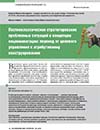Artificial Intelligence as a Tool for Strategizing Innovation Development of Russia
DOI: 10.33917/es-3.195.2024.50-59
Innovation is a key factor in the modern economy development. At the same time, strategic planning in the context of innovation development is a primary step towards scientific and technological leadership and sovereignt y. In the modern world, key powers are investing enormous amounts of money in the race for leadership in the field of ar tificial intelligence, defining innovation for the coming years and decades. At the moment most countries, including Russia, have already formed their strategic vision for this sphere’s development. If we consider ar tificial intelligence technologies not just as a way to automate production processes, but as a tool to transform the entire economy due to the synergistic ef fect from introducing these technologies, then the question of the current role of AI in strategizing innovation becomes paramount. Analysis of the relationship between strategic planning documents and the National AI Development Strategy will mak e it possible to identify its place in the existing hierarchy of strategic documents and, as a result, to determine the strategy’s potential in stimulating Russia’s innovation development and economic transformation.
References:
1. Ukaz Prezidenta RF ot 10 oktyabrya 2019 g. N 490 “O razvitii iskusstvennogo intellekta v Rossiyskoy Federatsii” [Decree of the President of the Russian Federation dated October 10, 2019 No. 490 “On the Development of Artificial Intelligence in the Russian Federation”]. Garant, available at: https://base.garant.ru/72838946
2. Porter M. Konkurentnaya strategiya. Metodika analiza otrasley konkurentov [Competitive Strategy. Methodology for Analyzing Competitors’ Industries]. Moscow, Al’pina Pablisher, 2015, 435 p.
3. Khamel G., Prakhalad K.K. Konkuriruya za budushchee. Sozdanie rynkov zavtrashnego dnya [Competing for the Future. Creating Tomorrow’s Markets]. Moscow, Olimp-Biznes, 2014, 288 p.
4. Kvint V.L. Kontseptsiya strategirovaniya [Concept of Strategizing]. Kemerovo, Kemerovskiy gosudarstvennyy universitet, 2022, 170 p., DOI: 10.21603/978-5-8353-2562-7
5. Artificial Intelligence Index Report, 2023. Stanford University, available at: https://aiindex.stanford.edu/report/
6. Pasport FP “Iskusstvennyy intellect” [FP Passport of “Artificial Intelligence”]. Konsul’tantPlyus. Sudebnye i normativnye akty RF, available at: https://sudact.
ru/law/pasport-federalnogo-proekta-iskusstvennyi-intellekt-natsionalnoi-programmy
7. Indeks gotovnosti prioritetnykh otrasley ekonomiki Rossiyskoy Federatsii k vnedreniyu iskusstvennogo intellekta: Analiticheskiy otchet [Index of Readiness of Priority Sectors of the Russian Economy for Implementing Artificial Intelligence: Analytical Report]. Analiticheskiy tsentr pri Pravitel’stve RF; MGU imeni
M.V. Lomonosova, 2021, 159 p.
8. Kolin K.K. Novyy etap razvitiya iskusstvennogo intellekta: natsional’nye strategii, tendentsii i prognozy [New Stage of Artificial Intelligence Development: National Strategies, Trends and Forecasts]. Strategicheskie prioritety, 2019, no 2(22), pp. 4–12.







